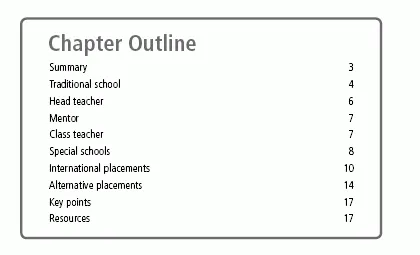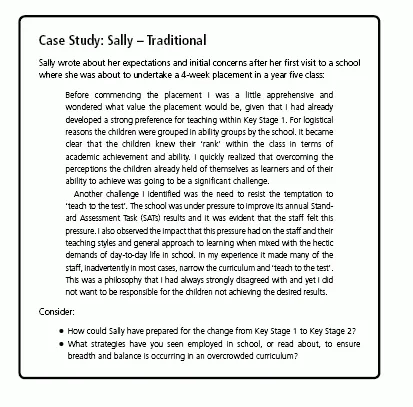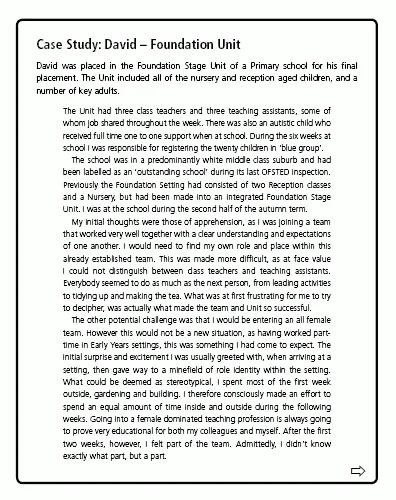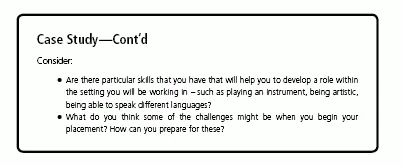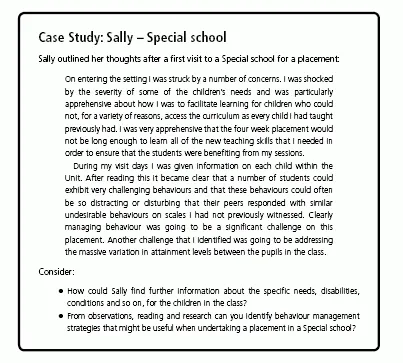![]()
Part I
Before You Go
![]()
1
Why Go on Placement?
Summary
Placements should be the most exciting part of training to be a teacher, and the highlight of programmes that include educational placements. It is hugely rewarding when you see that children and students are learning new knowledge, understanding and skills from the work you are doing with them. As such, placements can provide opportunities that could be life enhancing and even life changing.
The title of this chapter might appear to be a very straightforward question; but there are many answers depending on who is answering the question. There are various people who have a role to play in every placement. Understanding the expectations and concerns of all those involved will help you get the most out of the placements that you undertake.
We will explore how those involved in placements will have different expectations, perspectives and issues, depending on what role they have. We will consider traditional school placements and see how the head teacher will have different expectations and views from the mentor, the class teacher and the children and students. We will examine Special Schools, and how their context changes the expectations and issues for those involved. International placements and alternative placements will be discussed and we will demonstrate how the answers to the question, ‘Why go on placement?’ can be many and varied. Understanding the expectations and potential anxieties of the people involved in providing your placement will help you prepare for a positive and enjoyable experience.
Traditional school
If you are training to be a teacher in England, you can expect that most of your placements will be in a ‘traditional’ school, which are generally state funded and provide free education for children and young adults between 4–18 years of age.
Sally highlighted some of her own anxieties, and understandably, they related to her desire to do well on the placement. She also demonstrated sensitivity to a potential clash of agendas concerning teaching styles and SATs. Being able to identify the potential for a difference between your hopes and expectations and those of your placement school is very important. You should always remember that on a placement, you are an invited guest, and that the invitation can be withdrawn, just as it was offered.
David highlighted two initial concerns. First, he found it a challenge to understand the exact roles of each person in the Unit. This made it difficult for him to see how he would fit into the setting. Understandably, this created some initial anxiety, but he soon found a role. His second anxiety concerned gender. Educational settings and schools, especially in the Early Years and Primary age phase, tend to have significantly more female teachers, and few, if any male teachers. By this stage in his course, David was accustomed to this situation. So he ensured that he developed his own role within the setting, and managed to extend his involvement beyond improving the outdoor environment.
Head teacher
Generally speaking, head teachers in schools are keen to help participate in training teachers of the future, which is why they offer student placements. They have a vested interest in teacher training and preparation, because it is very likely that at some point in the future they will need to appoint new teachers, and they want them to be as effective as possible. They also recognize that it is very good professional development for teachers to work with students. It is often not until you have to explain something to someone else that you realize how much you know and understand. Supporting a student is also a positive way for the teachers to gain new and different ideas. If a student is going to be working with the children and students for a substantial amount of the time, head teachers recognize opportunities for the teacher to develop other work during that time, as well as being available to support the student, if needed.
One of the concerns for head teachers (HTs) when they agree to take a student on placement is that it may be time-consuming for the staff involved, and could be perceived as a significant amount of additional work, as well as a benefit. You should be aware of this, and try to ensure that you avoid taking up more of the teacher’s time than is really needed.
Mentor
Most schools will have a designated teacher who is responsible for students. They may have a different title, depending on where you are studying, but their role is to mentor you on placement, to give you constructive feedback and advice. If you are a student teacher your mentor will also need to assess your progress against TDA (2008) Standards for Qualified Teacher Status (QTS). Mentors are teachers who have a strong desire to help students become effective teachers and they have often received specific training in how to support, guide and assess students.
Although mentors are willing to help you in all aspects of your placement, they have expectations of you. They want you to be enthusiastic and eager to learn. They will not expect you to know everything, but they will expect that you are committed to the placement, and willing to work hard and be as well prepared as you can be. However, they will expect you to be interested, listen to and act upon advice. Although this may sound fairly easy to accomplish, you may find that in fact it can be quite challenging as you might not always agree with your mentor. It is fine to have a professional conversation with your mentor, but remember that they have had years of experience and if, after discussion, there is still a disagreement you need to follow your mentor’s advice.
Two of the most significant initial concerns for a mentor, are that a student will not listen to or act on advice given; or not be fully committed to the placement and not give the time and effort that is expected. Teaching and work with children and students can be very demanding, and teachers often work many hours in addition to the time they are actually in a school or setting. This may lead to mentors sometimes finding it frustrating, when they consider that sufficient effort is not being put into the placement or that advice is being ignored and issues are developing.
Class teacher
In some situations your mentor and class teacher will be the same person; but in other situations they are not, and it will be the class teacher you will spend the most time with. Although many of the teacher’s hopes for and expectations of the placement will be similar to that of the mentor, the class teacher will have some that are particular. During your placements you will become increasingly aware that the children and students become very important to their teachers, and hopefully to you. Teachers will care very deeply that the children and students do well. As a result, they will want you to demonstrate that you can be effective before they feel confident to give you increased responsibility for the class.
The children’s and student’s learning is paramount and class teachers are bound to have slight apprehension that their learning might be effected if a student takes on some of the responsibilities. However, as long as you are willing to work hard and act upon advice, you can dispel those initial concerns and develop positive relationships with teachers, staff and the children and students in the setting.
Special schools
DfES (2004) ‘Removing Barriers to Achievement’ set out the Government’s vision for giving children with special needs and disabilities the opportunity to succeed. This document stated that all children should have opportunities to learn, play and develop alongside each other, within their local community of schools, with shared responsibility and a partnership approach to their support. Children with special educational needs tend to be included in mainstream schools whenever appropriate and possible. Nevertheless, there are many Special Schools, which can provide enlightening and valuable placement opportunities for students and teachers. There are different kinds of Special school and they may have specific areas of need that they cater for, such as:
•Generic special needs schools
•Dyslexia specialist and dyslexia friendly schools
•Schools for children with speech, language and communication difficulties
•Autism and ASD (autism spectrum disorders) specialist schools
•Schools for children with sensory impairments, physical and medical needs
•Schools that specialize in emotional and behavioural difficulties
•Schools for children with global learning difficulties: MLD schools, SLD schools and schools for children with profound and multiple difficulties and complex needs
•Special Units that are attached to mainstream schools.
Some of the most obvious distinctions between Special Schools and mainstream schools are that the number of children and students in a class tend to be fewer; and that the number of adults involved in the education and care of the children and students will tend to be higher. Generally, the hopes, expectations and concerns that apply to placements in mainstream schools are also applicable to Special Schools; although there may be some significant differences, as highlighted by Sally.
Not surprisingly, Sally’s greatest concern was behaviour management and how she would cope. Equally, the head teacher and other teachers would have the same concerns regarding how well a student would cope with the behaviour challenges. If you have a placement in a Special school, observe the staff closely and take on board their advice and guidance. They are used to working as a team, and it will be your aim to become an effective member of the team.
The second area of concern to Sally was how to make the learning appropriate because of the wide range of special needs that prevented the children from accessing the whole curriculum. Even within a Unit of 11 children there was a huge range of ability. The hopes, expectations and concerns of all parties are very different in a Special school, and it is important to consider this before opting for a Special school placement. This will be considered in more detail in Chapter 2.
International placements
Many Higher Education Institutions (HEIs) offer wonderful opportunities for undergraduate (UG) students to undertake ‘international’ placements, abroad. If you are a postgraduate (PG) student you may have the opportunity to be involved in an international placement, if you are focusing on Modern Foreign Languages (MFL), for example. These provide the chance to gain experience of preparation for, and participating ...

